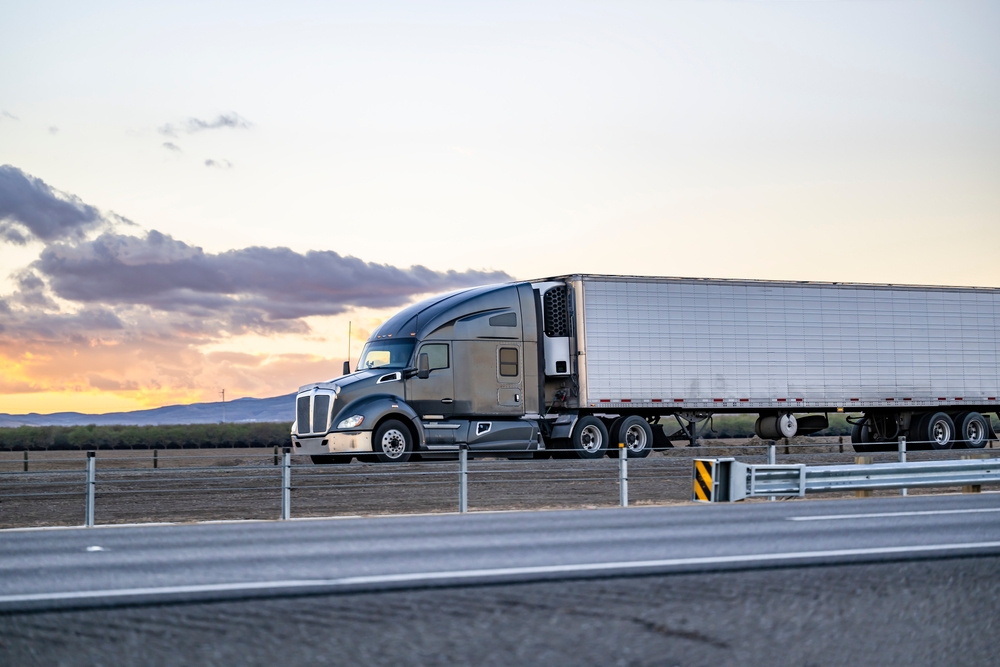Long before its tires ever crossed a busy Austin highway or navigated a winding Colorado mountain pass, the commercial truck that changed your life had a history. That history is written in maintenance logs, driver schedules, and hiring files. Was a known safety issue ignored? Was the driver pressured to skip a mandatory rest break? Was the cargo loaded unsafely to save a few minutes?
The answers to these questions are what separate a simple driver error from corporate negligence, and they are essential to determining when the shipping company is liable for the accident.
Key Takeaways about When a Shipping Company is Liable
- A shipping company may be held responsible for a driver’s negligence under a legal principle known as vicarious liability.
- The company’s liability often hinges on whether the driver is legally classified as an employee or an independent contractor.
- Shipping companies can also be held directly liable for their own negligence, such as failing to properly train drivers or maintain their vehicles.
- Strict federal and state regulations govern the trucking industry, and violations can serve as strong evidence of a company’s fault.
- Determining liability in a commercial vehicle accident can be complex, sometimes involving multiple parties beyond just the driver and the shipping company.
Understanding the Driver’s Role: Employee vs. Independent Contractor

One of the first questions in determining a shipping company’s responsibility after a truck accident is the legal status of the driver. Many people assume that anyone driving a truck with a company logo on the side is an employee, but that’s not always the case. Companies often classify their drivers as “independent contractors” in an attempt to shield themselves from liability.
The law, however, looks beyond these labels. The core issue is control. If the shipping company exerts significant control over how, when, and where the driver performs their work, a court may consider them an employee, regardless of what their contract says. This is where a legal concept called respondeat superior comes into play. It’s a Latin phrase that means “let the master answer,” and it holds an employer responsible for the wrongful acts of an employee, as long as the employee was acting within the scope of their employment at the time of the incident. This is a form of vicarious liability, where one party is held responsible for the actions of another.
Courts look at several factors to determine whether a driver is truly an employee or an independent contractor:
- Degree of Control: Does the company dictate the driver’s routes, schedule, and daily tasks? Or does the driver have the freedom to choose their own jobs and methods?
- Method of Payment: Is the driver paid a regular salary or an hourly wage, or are they paid per job or by the mile?
- Ownership of Equipment: Does the driver own their own truck and tools, or does the company provide the vehicle and necessary equipment?
- Nature of the Work: Is the driver’s work a core, integral part of the shipping company’s business?
Understanding this distinction is vital, as it can be the difference between holding a multi-million-dollar corporation accountable and only being able to seek compensation from the individual driver’s insurance policy.
Direct Negligence: When Is the Shipping Company Directly Liable?
Sometimes, the shipping company is at fault not just because of its driver’s actions, but because of its own carelessness. This is called direct negligence. It means the company itself failed to act with reasonable care, and that failure was a direct cause of the accident and your injuries. Even if a driver is classified as an independent contractor, the company can still be held liable for its own negligence.
Several common failures can lead to a shipping company’s direct liability.
Negligent Hiring and Retention
Shipping companies have a duty to hire safe and qualified drivers. This means they should conduct thorough background checks and review a candidate’s driving record and employment history. If a company hires a driver with a history of DUIs, reckless driving, or multiple accidents and that driver then causes a crash, the company may be liable for negligent hiring.
The same principle applies to keeping a dangerous driver on the payroll. If a company learns that one of its drivers is consistently violating safety rules but does nothing about it, it could be liable for negligent retention.
Inadequate Training and Supervision
Driving a massive commercial vehicle, especially through challenging conditions like the traffic on I-35 in Austin or the mountain passes along I-70 near Grand Junction, requires extensive training. Companies are responsible for ensuring their drivers are properly trained on:
- The specific vehicle they operate.
- Safe driving techniques, including defensive driving in adverse weather.
- Federal and state safety regulations.
- Procedures for securing cargo properly.
A lack of proper training or ongoing supervision can lead to predictable and preventable accidents, making the company directly responsible for the outcome.
Poor Vehicle Maintenance
A semi-truck is a complex piece of machinery with thousands of moving parts. Brakes, tires, steering systems, and lights must all be in excellent working order. The Federal Motor Carrier Safety Administration (FMCSA), the main federal body regulating the trucking industry, has detailed rules for vehicle inspection and maintenance.
When shipping companies cut corners on maintenance to save money, they put everyone on the road at risk. A crash caused by a bald tire, faulty brakes, or a broken headlight can be traced directly back to the company’s failure to maintain its fleet.
Pressuring Drivers to Violate Safety Rules
The logistics industry is built on speed, and tight deadlines can create a dangerous culture. Some companies place immense pressure on drivers to deliver their loads as fast as possible. This pressure can lead drivers to speed, drive while fatigued, or violate the FMCSA’s Hours of Service rules, which strictly limit how long a person can drive without a rest break.
If an investigation reveals a company encourages or turns a blind eye to these violations, it can be held directly liable for creating the dangerous conditions that led to an accident.
Understanding the Driver’s Role: Employee vs. Independent Contractor

Because of the immense danger they can pose, commercial trucks are heavily regulated at both the and state levels. These regulations are not just suggestions; they are the law. A violation of a safety regulation can be powerful evidence of negligence in a personal injury case.
The FMCSA sets the baseline for safety across the country, covering everything from driver qualifications and drug testing to vehicle maintenance and cargo securement. In addition to federal laws, both Texas and Colorado have their own specific traffic laws that apply to all drivers, including commercial truckers.
For example, the Texas Transportation Code outlines rules of the road, including speed limits and safe following distances, that are critical in accident cases. Similarly, the Colorado Revised Statutes detail responsibilities for drivers regarding speed and vehicle control. An experienced truck accident attorney will investigate whether the shipping company or its driver violated any of these critical safety rules.
What to Do After an Accident with a Shipping Company Vehicle
After you’ve received initial medical attention and are back home, the path forward can seem daunting. Taking a few organized steps can help protect your rights and prepare you for the process ahead.
- Organize Your Documents: Start a folder for everything related to the accident. This includes the police report, the information exchanged with the other driver, photos of the scene, and all medical records, bills, and receipts.
- Keep a Detailed Journal: On a daily or weekly basis, write down your experiences. Note your pain levels, any physical limitations, medical appointments, and how your injuries are impacting your work, family life, and emotional well-being. This record can be invaluable later on.
- Be Cautious with Insurance Adjusters: You will likely receive a call from an insurance adjuster representing the shipping company very soon after the accident. Remember, their job is to protect their company’s financial interests, which means minimizing the amount they pay you. You are not obligated to give a recorded statement. It is often wise to consult with a legal professional before speaking with them.
- Preserve Evidence: Hold onto any physical evidence you have, such as damaged personal property from the accident. If your vehicle was towed, make sure you know where it is and that it is being preserved in its post-accident state until it can be professionally inspected.
These steps can help you stay organized and protect your interests during a confusing and difficult time, allowing you to focus on your recovery.
The Complexities of Cargo and Loading
In some truck accident cases, the liability extends beyond the driver and the shipping company. The way cargo is loaded and secured onto a truck is critical for the vehicle’s stability and safety. If cargo is improperly loaded, it can shift during transit, causing the driver to lose control or the truck to roll over. In other cases, unsecured cargo can fall off the truck and onto the road, creating a hazard for other drivers.
When this happens, a third party may be partially or fully responsible. Often, the company that loads the truck is different from the company that owns the truck or employs the driver. Investigating the accident means looking at the entire supply chain to determine if a loading company’s negligence contributed to the crash.
Shipping Company Liability FAQs
Here are answers to some common questions that arise when trying to determine a shipping company’s liability after an accident.
What if the truck driver was on a personal errand during the accident?
This situation involves a legal concept known as “frolic and detour.” If a driver deviates significantly from their job duties for a personal reason (a “frolic”), the employer may not be responsible. However, if the deviation is minor (a “detour”), such as stopping for a quick lunch along the assigned route, the employer is generally still considered liable. The specifics of the situation are very important in making this determination.
How long do I have to file a claim against a shipping company in Texas or Colorado?
Every state has a law called the “statute of limitations,” which sets a strict deadline for filing a lawsuit. In both Texas and Colorado, the general statute of limitations for personal injury claims is two years from the date of the accident. There can be exceptions, but missing this deadline typically means you lose your right to seek compensation forever.
Can a shipping company be liable for an accident caused by a tire blowout?
Yes, it is very possible. A tire blowout can be caused by a manufacturing defect, but it is often the result of improper maintenance, such as using old, worn, or underinflated tires. Shipping companies have a legal duty to properly inspect and maintain their entire fleet, including the tires. If a failure to do so leads to a blowout and a crash, the company can be held negligent.
What kind of compensation can be recovered in a truck accident case?
While every case is unique, compensation is intended to cover the harms and losses a person has suffered. This can include economic damages like medical bills (past and future), lost wages, and diminished earning capacity. It can also include non-economic damages for things like pain and suffering, emotional distress, physical impairment, and loss of enjoyment of life.
You Don’t Have to Face Goliath Alone

We understand that standing up to a massive shipping company and its team of insurance adjusters and lawyers can feel like an impossible battle. These corporate giants have vast resources and will do everything they can to deny your claim or pay you as little as possible. It’s an intimidating position for anyone to be in, especially while trying to recover from serious injuries.
This is precisely the kind of fight Slingshot Law was built for. We believe that every person deserves a fair fight, and we are dedicated to being the game-changing weapon in your battle against the Goliaths of the insurance industry.
If you have been injured in an accident involving a commercial truck in Austin, Texas, or Grand Junction, Colorado, we can help. Contact us today at (866) 647-1311 or through our online form for a free, no-obligation case review. Let us handle the fight so you can focus on what matters most—getting back on your feet.


